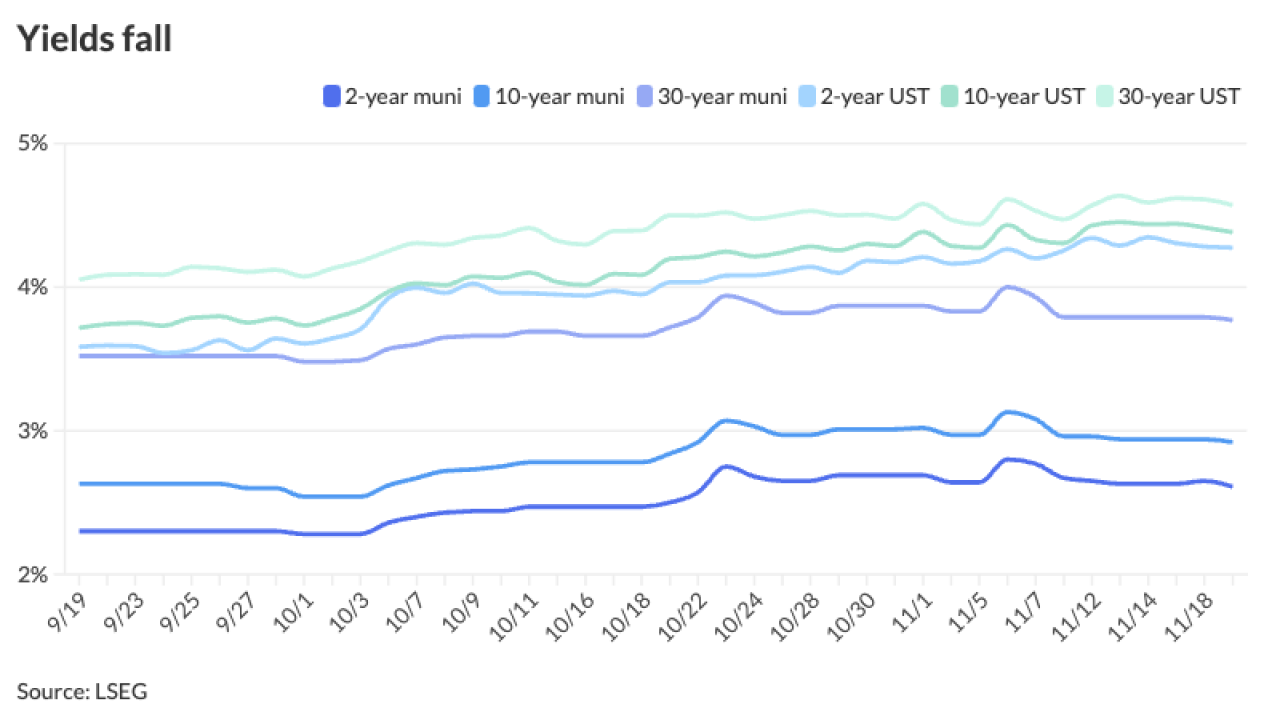CHICAGO — Illinois is “treading water,” as strong tax revenue growth for the first three quarters of the fiscal year failed to make a dent in a rising backlog of state obligations that totaled $9 billion at the end of March, according to the state comptroller’s quarterly report.
The report comes as the state prepares to enter the market on May 1 with a roughly $1.8 billion general obligation refunding for savings and later in the month with a $375 million taxable sales tax-backed deal. All three rating agencies affirmed Illinois’ GO ratings last week.
General fund bills owed by the state totaled $5.57 billion at the end of March, up by $1.3 billion from three months ago, due in part to payments due to the state’s pension system. That backlog counts only bills submitted to Comptroller Judy Baar Topinka’s office. When additional obligations being held by state agencies are added, the figure rises to more than $9 billion. The higher number includes $2 billion in Medicaid payments.
“Despite being three quarters into the first full year of the state tax increases, Illinois’ financial position has not improved,” the comptroller wrote in the report for the quarter ending March 31, published Monday. “In fact, the bill backlog has increased in the most recent quarter, and payment delays are expected to persist for foreseeable future.”
The state closed out the last quarter with a negative general fund balance of $4.3 billion compared to a $4.5 billion negative balance at the same time last year, when state coffers had yet to reap the benefits of an income tax increase approved in January 2011.
State revenues rose by 3.9% over the first three quarters of fiscal 2012, bolstered by the 2011 tax increase and improved consumer spending. The increase partially offset falling federal revenues and one-shots previously used by the state to bolster the fiscal 2011 balance sheet, including a tobacco bond sale. Federal revenues declined by $2.1 billion, or by 48%, due primarily to a drop in the federal Medicaid reimbursement rate.
The state’s individual income tax collections have grown dramatically by 50.4% through the third quarter of the fiscal year while corporate income taxes grew by 33.1% and sales taxes were up by 6.2%. General fund spending has dropped by 2.8 % through the first three quarters.
“Illinois continues to face staggering fiscal challenges,” the report says. “While tax revenues are up significantly, the falloff in federal revenues and current revenue funding of the payments to the pension systems create a situation where Illinois is essentially treading water.”
The general fund backlog at the close of the fiscal year June 30 will depend on revenue performance and spending decisions although the comptroller anticipates the numbers will mirror the fiscal 2011 ending backlog of $3.8 billion.
The General Assembly’s Commission on Government Forecasting and Accountability, in a recent monthly revenue briefing, wrote of the backlog: “These unpaid bills are a significant threat to the Illinois economy. By not paying these bills in a timely manner, the state is likely hindering other potential economic activity.”
Rating agencies consider the backlog one of the state’s central obstacles to fiscal stability, along with rising Medicaid and pension expenses. Gov. Pat Quinn last week outlined plans to trim $2.7 billion in Medicaid costs and shore up the pension system through various reforms, but his proposed $34 billion budget does little to address to the backlog.
Standard & Poor’s rates Illinois A-plus with a negative outlook. Moody’s Investors Service rates its general obligation debt A2 with a stable outlook. Fitch Ratings assigns an A and a stable outlook.
“If the state does not implement meaningful changes to further align revenue and spending and address its accumulated deficit for fiscal 2013, we could lower the rating this year,” Standard & Poor’s report said last week. “If solutions are implemented to address Illinois’ significant pension liability and revenues and expenditures are successfully aligned for fiscal 2013, thereby stabilizing the state’s finances, we could revise the outlook to stable.”
Topinka recently added a new feature, dubbed “The Ledger,” on the front page of the comptroller’s website,
“Beyond providing the day’s balances and transactions, the site allows taxpayers to inspect state revenues, expenses, contracts and salaries — all without having to move from their home computer,” Topinka said in a statement.
The senior managers for the GO refunding are Jefferies & Co., BMO Capital Markets and Duncan-Williams Inc./Rice Financial Products Co.
KeyBanc Capital Markets Inc. is lead on the sales tax issue.





